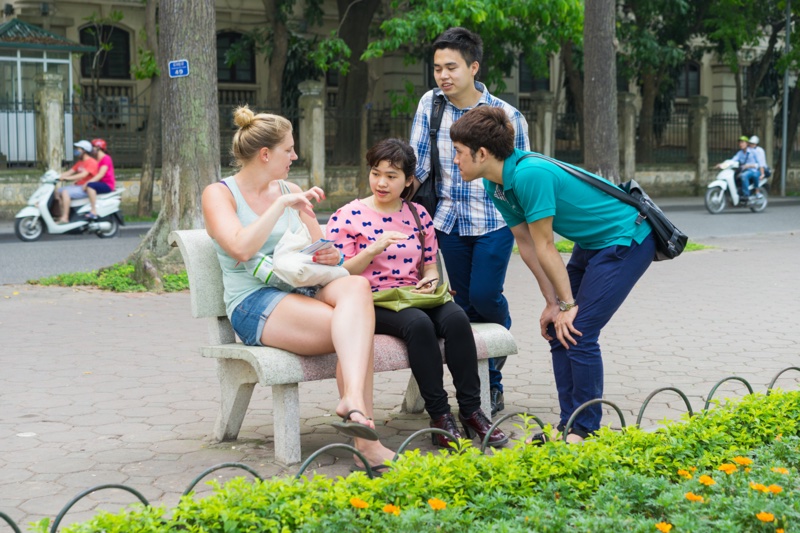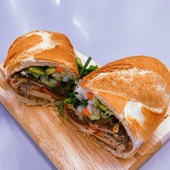It is HELLO instead of XIN CHAO
Vietnamese have a long history of learning languages.
Vietnamese people have a rich history of language learning. It is almost intrinsic to their culture. This small, vibrant nation in Southeast Asia has attracted foreign interests for centuries, shaping its linguistic landscape. Over the years, the dominant languages have evolved, transitioning from Mandarin and Cantonese during earlier centuries, to French for about 80 years, and then to Russian for a time, before English emerged as the predominant foreign language in contemporary Vietnam.
In today’s Vietnam, there is an undeniable enthusiasm for learning English among people of all ages. English has become the primary second language choice, even among ethnic minorities who may not speak Vietnamese as their first language. In popular tourist areas like Sapa, children from ethnic groups such as the Yao and Hmong learn English at a young age. Although formal education might not be prevalent, these children often develop impressive language skills simply through their daily interactions with international visitors. Their English accents can be surprisingly fluent, much like a Native American who speaks French fluently but struggles with English.

The push for English proficiency goes beyond mere communication. Individuals across the demographic spectrum are eager to acquire this valuable skill, seeing it as an asset that enhances their employability. Many job listings, particularly in government and private sectors, require English proficiency as a criterion. Despite the high demand for language skills, some applicants fraudulently purchase certificates to meet these requirements, prompting government officials to crack down on this practice. Nonetheless, there are legitimate opportunities for those who are genuinely skilled, particularly as foreign investment continues to grow in Vietnam. Many sectors, such as restaurants and hotels, require staff to communicate effectively in English, especially with international customers.
The approach to foreign language education in Vietnam has also undergone significant changes. Since the initiation of the "Đổi Mới" (Renovation) reforms in 1986, there has been a gradual uptick in English language learning. In many modern elementary and secondary schools, English is often the sole foreign language option, reflecting a commitment to equipping the next generation with the skills needed to compete globally. However, there are still challenges, particularly in rural areas where access to English education may be limited. In contrast, well-funded urban institutions may offer additional language choices, but the prevalence of English learning is an increasingly integral part of education for most Vietnamese youth.
 Group of students learning English with a native speaker
Group of students learning English with a native speaker
The mandate for English education raises questions about the quality of instruction. Many teachers, originally trained in languages such as Russian, have had to transition to teaching English without adequate training or resources. As a result, many students may only grasp English grammar while struggling with conversation skills. This disconnect has led many parents to distrust the public education system and seek out private English-language centers for additional training, leading to an increase in opportunities for expatriate teachers.
The landscape of language centers in Vietnam has shifted dramatically over the years. Starting with the establishment of Apollo in 1994, the first entirely foreign-invested language school, the market has grown significantly, with numerous institutions now available. Some observers suggest that the market has become oversaturated, comprising government-backed projects like ACET and the British Council, privately funded establishments like ILA, and local initiatives. Most centers employ native English speakers, supplemented by teaching assistants for beginner classes. Teaching English has become a lucrative profession for many expatriates, yet high standards are still expected.
Despite the perception that any native English speaker can teach, the demand for qualified foreign teachers remains strong. A significant number of teachers in Vietnam hold TESOL certification, but the quality varies widely. Unfortunately, some teachers capitalize on the friendly and welcoming nature of the Vietnamese people, resulting in a transient workforce where many instructors only stay for a brief period. Dedicated educators are scarce, and the frequent turnover of unqualified staff hinders the progress of students. Established and reputable centers tend to avoid hiring short-term teachers, yet many continue to flourish due to high demand. With a GDP per capita of around $1,200, owners of these centers can earn substantial profits, sometimes as high as $10,000 per month.
English's rise in Vietnam is also attributed to its convenience. Unlike many neighboring countries, Vietnam adopted a Latin-based alphabet in the early 20th century, making the transition to English less daunting for students. The phonetic elements of Vietnamese language often align closely with English sounds, fostering familiarity for learners. Many argue that Vietnamese speakers possess some of the best English accents in Asia, aiding their integration into international educational environments. For instance, Hanoi-Amsterdam High School reports that two-thirds of its students go abroad for further studies, highlighting the increasing global aspirations of Vietnamese youth.
While the journey to mastery in English is challenging, many Vietnamese students, who may not be naturally inclined to self-advocate or express individual opinions, struggle to learn independently. They often rely heavily on teachers for guidance, which can lead to a lack of initiative. This hesitation stems from a cultural tendency to value collective over individual opinions, making the shift to self-directed learning challenging. Consequently, many students opt to continue attending classes rather than undertake self-study, perpetuating a cycle of dependency that benefits language centers.
The influence of English in Vietnamese everyday life has sparked an interesting blend of languages, particularly among youth who have studied abroad. As they return, these students bring a propensity to mix English into their conversations, creating a dynamic linguistic environment. Critics of this trend argue that it diminishes the purity and depth of the Vietnamese language, which can be perceived as "spoiling" its rich heritage. Nevertheless, language is inherently fluid, and new terms are continually incorporated as societies evolve, demonstrating that language development is an ongoing process.
In conclusion, while English opens many doors and opportunities, the trend of learning it in Vietnam also reveals some challenging aspects. Students often grapple with questions about the purpose of education, particularly in a rapidly changing world. The answers may not be straightforward, but the importance of English as a bridge to the future remains clear.
So, if you want to thrive, mastering English is essential!

Best Things To Do In Moc Chau
Moc Chau Town is among the top-rated tourist destinations in northern Vietnam brimming with ultramodern and natural sightseeing attractions.

Vietnamese Snacks Among Best In The World
Vietnamese cuisine has long been known as among the most abundant and delicious cuisines in the world.

The Most Expensive "Banh Mi" In Ho Chi Minh City That Is Worth A Try
Long queues of Saigoneses, tourists, and shippers in front of the "banh mi" Huynh Hoa shop have long become a familiar scene every afternoon.








